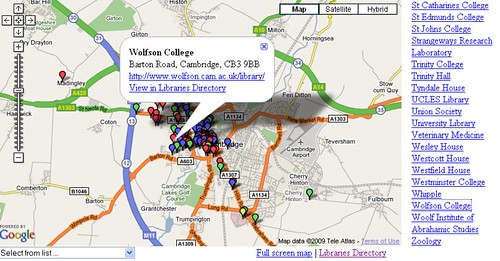Starting with Keren Mill's M-Libraries - Information on the move report [PDF], a few things jumped out at me:
- "Mobile OPAC: Staff at Cambridge University Library have observed customers using their camera phones to take pictures of the catalogue results screen, rather than noting class marks on a piece of paper. 50% of respondents at both universities said they take photos of signs, books, etc to save information for later reference." [p8]
This maybe lends some sort of post hoc third party justification for my first hack on the Arcadia Mashups Blog: Visual Links - Sharing Links With QR Codes where I posted a quick bookmarklet to show what a QR code on the OPAC might look like and where it might point to, as well as pondering what a library shortcode might look like... - "Mobile OPAC: In the long term libraries could work with their Library Management System supplier (LMS) to create a mobile version of their library catalogue. There is already a mobile application for OCLC’s WorldCat, so libraries who submit their catalogue records to WorldCat could make use of that to pilot the service." [p8-9]
I think that the Cambridge University Library Newton catalogue is accessible via WorldCat, so there may be a quick win available there, e.g. producing a WorldCat mobile page that limits results to Cambridge University holdings (if that's possible?). I don't (yet...) know if Newton supports OpenSearch RSS, or whether it's user interface is easily scrapeable, but if so, a quick hack of a prototype web based iPhone/mobile like interface using iUI shouldn't be too hard to do...? - "Less than 16% of Cambridge respondents use their mobile phones to access the internet more than once a week, and only 25% do at the OU." [p10]
The report is dated May 2009 -it would be interesting to know if this percentage is increasing, e.g. as mobile phone clients for social networks such as Facebook become increrasingly available, and along with the rise of mobile app stores. There may also be a question of semantics - would a user of a mobile phone application for social network say that they are accessing the internet? Or would they regard the internet as something other - e.g. visiting a web page?
As to how they would like to be able to use their mobiles?
(Note that there's nothing there about the 'note taking' use of camera phones? Though that could be seen as a largely offline use, I guess, even if it is most powerful if tied in to an online reference generating service?)
As far as location maps go, a map of Cambridge U library locations is already available:
although opening time information does not appear to be universally available directly through the centralised directory?
So it looks like there may be a quick win there for a simple map based app/web page that included library opening times? A simple SMS text based interface might also be appropriate for delivering library opening time info, though the question remains as to how users would find the number to send the request message to...? [Note to self~: review my old, old thinkiing on this: Micro- and Appropriate Format Information Services]
Hmmm...



No comments:
Post a Comment